Autism and Evidence Based Treatment
List of Vendored ABA and Behavior Management Providers
Posted on: Jun 14, 2021
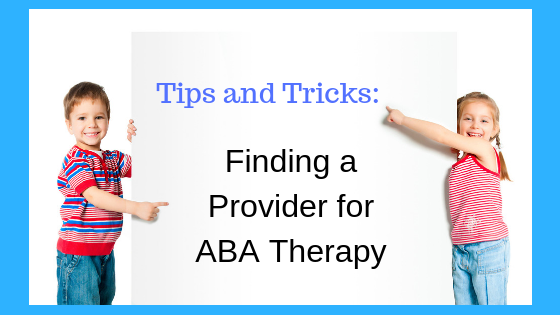
Choosing a Quality ABA Provider
Applied Behavior Analysis (ABA) is widely recognized as an evidence-based practice with strong scientific support for effectiveness with people with autism, intellectual disabilities and related disorders of all ages. For clients of Lanterman, in-home ABA services can be used in comprehensive or focused interventions to reduce problematic behaviors by teaching communication and adaptive skills. According to the National Autism Center, families should look for providers that:
- involve direct consultation by senior clinicians (doctoral-level or board certified professionals)
- include staff who can clearly describe the design and implementation of an intervention
- integrate research findings with professional judgment and data-based clinical decision making, the values and preferences of families, and capacity to effectively implement interventions
- address the comprehensive needs of individuals on the autism spectrum with sufficient intensity so children and adolescents can make meaningful progress
File
Person Centered Planning and You
Posted on: Jul 24, 2023
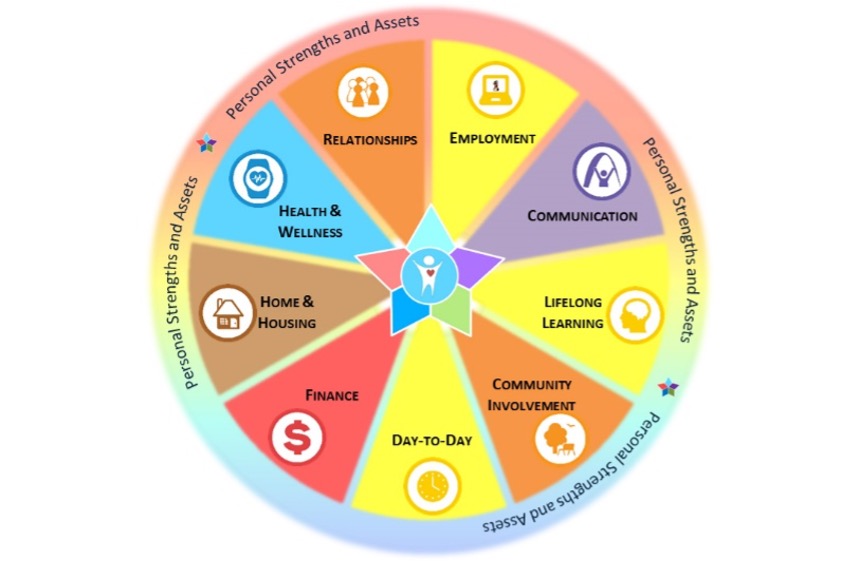
At Lanterman Regional Center, Person Centered Thinking is a service model based on the belief that everyone has the right to live a life that is meaningful, satisfying and fulfilling. Person centered thinking puts the individual first by listening carefully to learn who they are and what is important to them while balancing what is important for them. Through Person Centered Planning, your service coordinator works together with the individual and their family to create personalized goals in the plan that can then be put into practice. It is a way of thinking about and interacting with people we support to discover what a meaningful life looks like for them and describe what they need to get there.
Your Regional Center Service Coordinator serves as a consultant to the family in securing services that can be planned to support the person in developing communication and adaptive potentials, and growing in their community experience. Evidence-based approaches can be offered to support clients within the natural setting in which they currently participate, or designed for future settings and challenges to help ready the individual for a new job, a new circumstance, a new residence, or a new leisure/recreational activity. When supports are tailored to strengthen the individual’s special interests, and capitalize on the individual’s preferences and choices, each person takes an active role in realizing the steps towards their own preferred future.
Lanterman Regional Center is a partner in developing that preferred future with you and your family members. Find additional information about person centered planning by reviewing course offerings at Lanterman’s ARCALearn Parent Learning Center. Link directly to Lanterman’s short videos on service standards addressing options for work and diverse living options through Lanterman, and consult the Lanterman website for additional information about employment services. Learn more about the importance of choosing effective interventions to support skills and behaviors in natural environments at CAPTAIN, and through trainings offered through your Lanterman CAPTAIN Cadre members. New supports for addressing mental health are available through Lanterman Regional Center’s Systemic, Therapeutic, Assessment, Resources and Treatment (START) program services.
We encourage you to consult your service coordinator regarding the role of person centered planning in developing a meaningful life plan geared towards individual strengths, preferences and choices for your preferred future in collaboration with services and supports offered through the Lanterman Regional Center.
Contact Your Lanterman CAPTAIN Cadre Members:
Jean Johnson, BCBA-D - jjohnson@lanterman.org
Lisa Pirruccello, BCBA - lpirruccello@lanterman.org
Carmen Jimenez Wynn - cwynn@lanterman.org
File
Facilitate Employment Using Visual Supports – An Evidence-Based Practice
Posted on: Mar 20, 2023
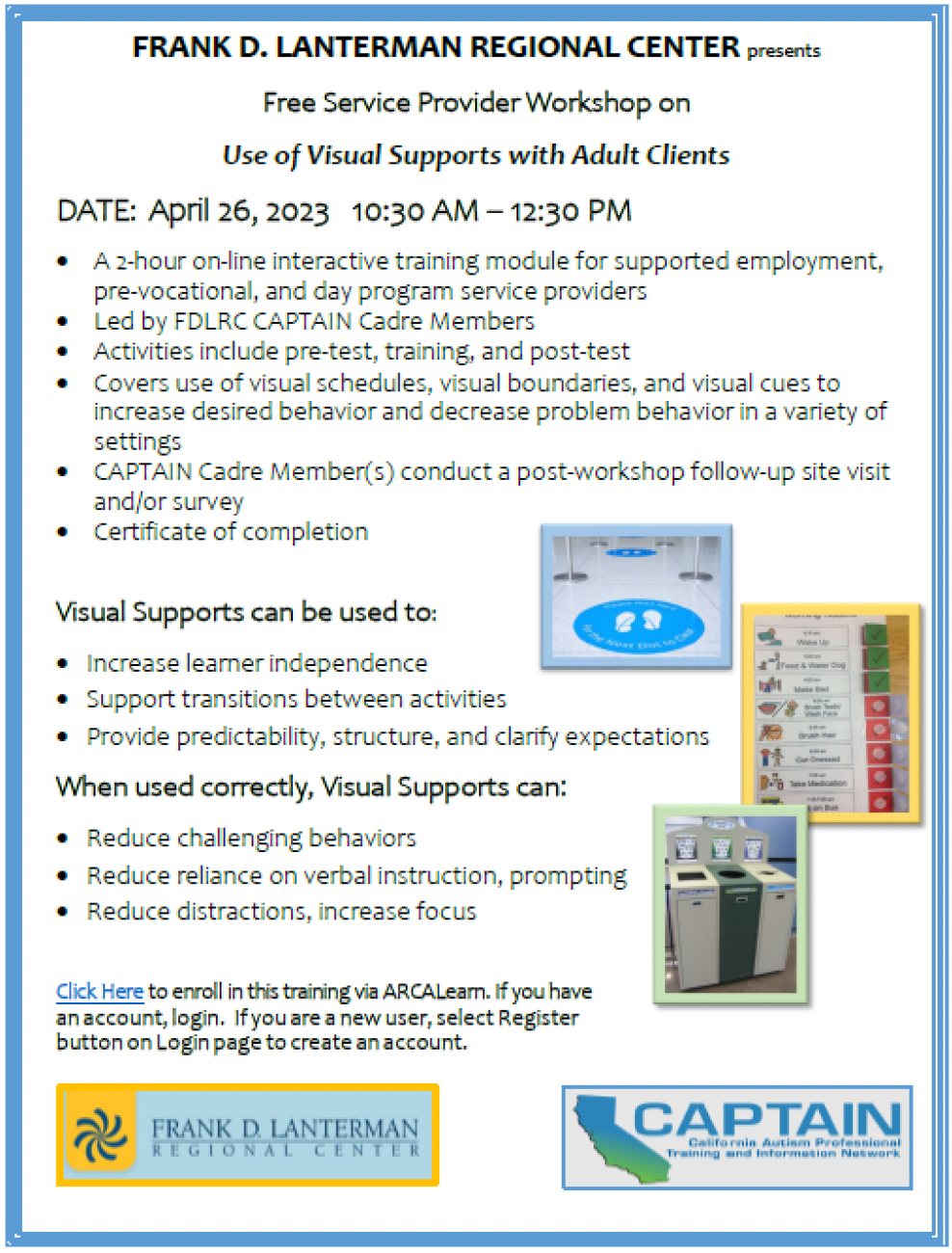
As services in California move towards fully inclusive employment opportunities in our communities, service providers are encouraged to use evidence based strategies to support individuals with developmental disabilities in natural ways. Understanding the use of Visual Supports opens multiple options to support clients in home and community natural settings. Visual supports include pictures, written words, objects, environmental arrangement, visual boundaries, schedules, maps, labels, organization systems, timelines, and scripts that can be useful in any natural environment. Research-based evidence indicates that visual supports are effective with adult clients to improve social, recreational, academic, vocational and adaptive skill areas. Visual supports can increase learner independence, support transitions between activities, and increase predictability, structure, and clarify expectations of the workplace or the job task. When used correctly, visual supports have been shown to reduce challenging behaviors, reduce reliance on verbal instruction and prompting, and reduce distractions and increase focus on task related activities.
To learn more about Visual Supports, interested service provider members of the Lanterman Employment Collaborative have an opportunity to participate in a Lanterman Visual Supports Workshop, provided in collaboration with CAPTAIN, the California Autism Professional Training and Information Network. The Training will cover the use of visual schedules, visual boundaries, and visual cues to increase desired behavior and decrease problem behavior in a variety of settings, including fully inclusive employment settings. The workshop will involve a 2-hour online interactive training module for service providers led by Lanterman CAPTAIN Cadre Members. CAPTAIN Cadre Member(s) will then conduct a post-workshop follow-up site survey and/or site visit at provider’s request to complete consultation and evaluate the usefulness of the visual supports with selected clients. Interested family members are welcome to attend this workshop on using Visual Supports by registering at ARCA Learn and typing Visual into the search bar. Click here to learn more about the training and register to attend
Additional information about free CAPTAIN trainings is available by contacting your Lanterman CAPTAIN Cadre members at jjohnson@lanterman.org. Check this page for information as future trainings arise. For additional information on employment services and supports available through Lanterman, parents and clients are encouraged to contact your service coordinator. Exciting opportunities for supported and independent employment are being developed through the Lanterman Employment Collaborative in conjunction with Lanterman Community Services Department to provide new incentives for finding and retaining paid employment through competitive integrated employment and paid internships. Learn more about evidence-based strategies to support adults’ participation in community based activities at the CAPTAIN website link to autism focused intervention resources and modules (AFIRM).
References:
Contact your Lanterman CAPTAIN Cadre members:
File
Celebrate Summer
Posted on: Jun 27, 2022
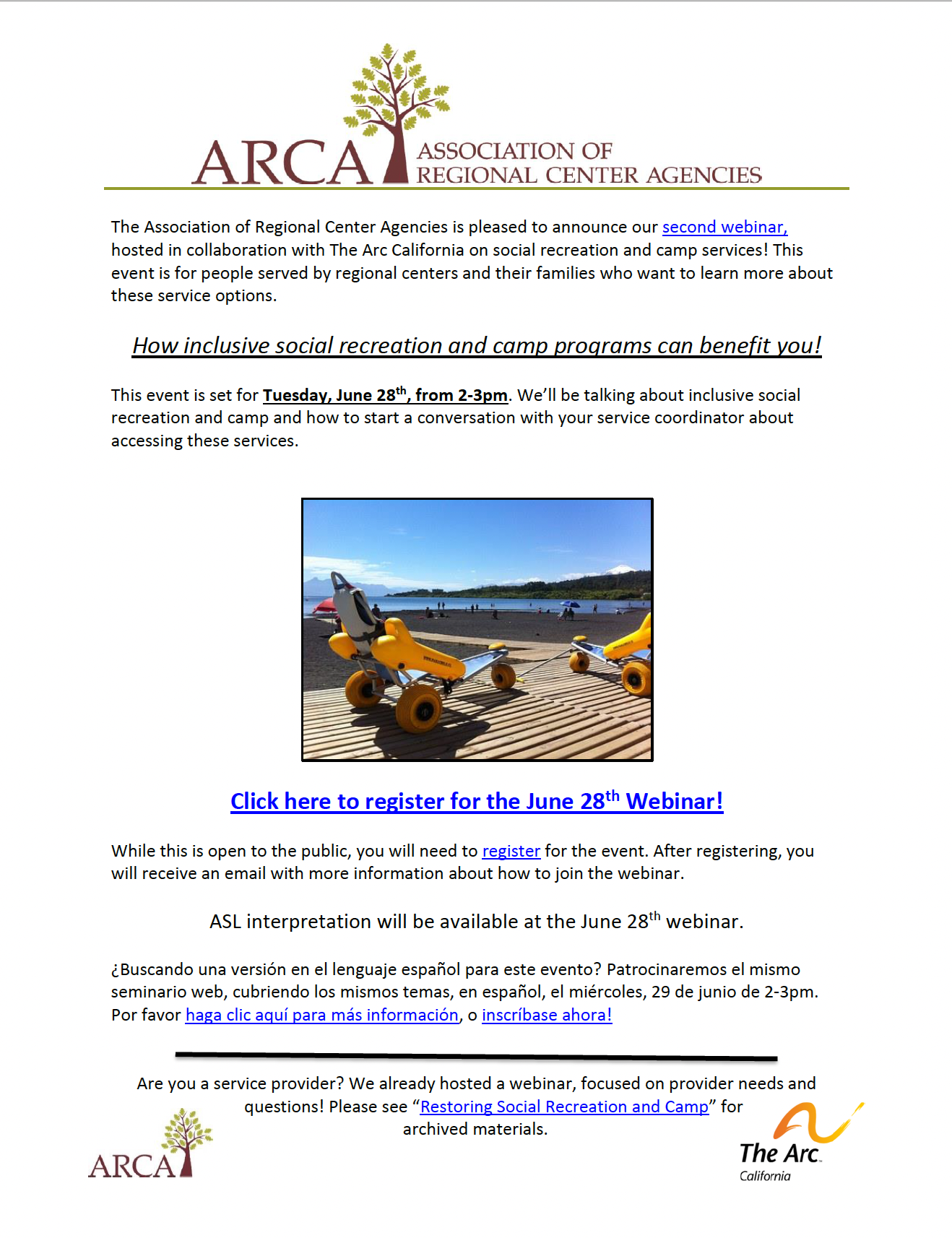
During summer, consider enriching your life with new activities, experiences, skills and adventures. Long periods of social distancing and isolation have increased the generalized stress and anxiety many of us feel today. Now, with summer breaks from work or classes and more time to explore new interests and participate in new activities, look to your local communities for activities that can enhance socialization, spark interest in new activities, and provide an opportunity for relaxation and rest. As you consider summer schedules for you and your family members, be sure to include your Lanterman service coordinator in your person-centered planning process. Learn about renewed DDS support for inclusive social/recreational programs at the upcoming webinar on inclusion and social recreational activities, provided through the Association for Regional Center Agencies (ARCA). Register for a free Webinar on Inclusive Social Recreational activities by clicking here.
Social recreation services provide opportunities to regional center recipients to participate in inclusive recreational activities in their own communities. Participation in inclusive activities at any age fosters development of social skills and personal relationships in the community and enhances enjoyment of daily life. Opportunities for inclusive social recreational activities are available via community colleges, city parks and recreation programs, local libraries, and community based classes like karate, dance, or music, all in support of individual interests and IPP goals. Inclusive Social Recreational Activities may include scouts, little league, soccer teams, library reading programs, gym classes and other organized recreational programs. Community based classes on topics of special interest including art classes, cooking classes, yoga, swim classes, may be found through community colleges or through private businesses in the community. Sleep-over camp and day camp activities open a window of guided fun experiences outside of the routine daily menu of activities available to an individual.
Supports needed for participation in social recreational services should be discussed with your Service Coordinator. For additional information regarding known benefits of social recreational activities on mood, socialization, communication, and learning new skills, see Association for Science in Autism website (asatonline.org). Where specialized teaching is needed to support participation, evidence based strategies including social skills training, peer supported participation, structured play groups, and cognitive behavior intervention can support participation and enhance skill development in a variety of areas. Learn more about evidence based strategies to support participation in community based activities at the CAPTAIN website link to autism focused intervention resources and modules (AFIRM). Speak with your service coordinator today to learn more.
References:
File
Join Lanterman for Our Family Dental Health Fair in Eagle Rock.
Posted on: May 13, 2022
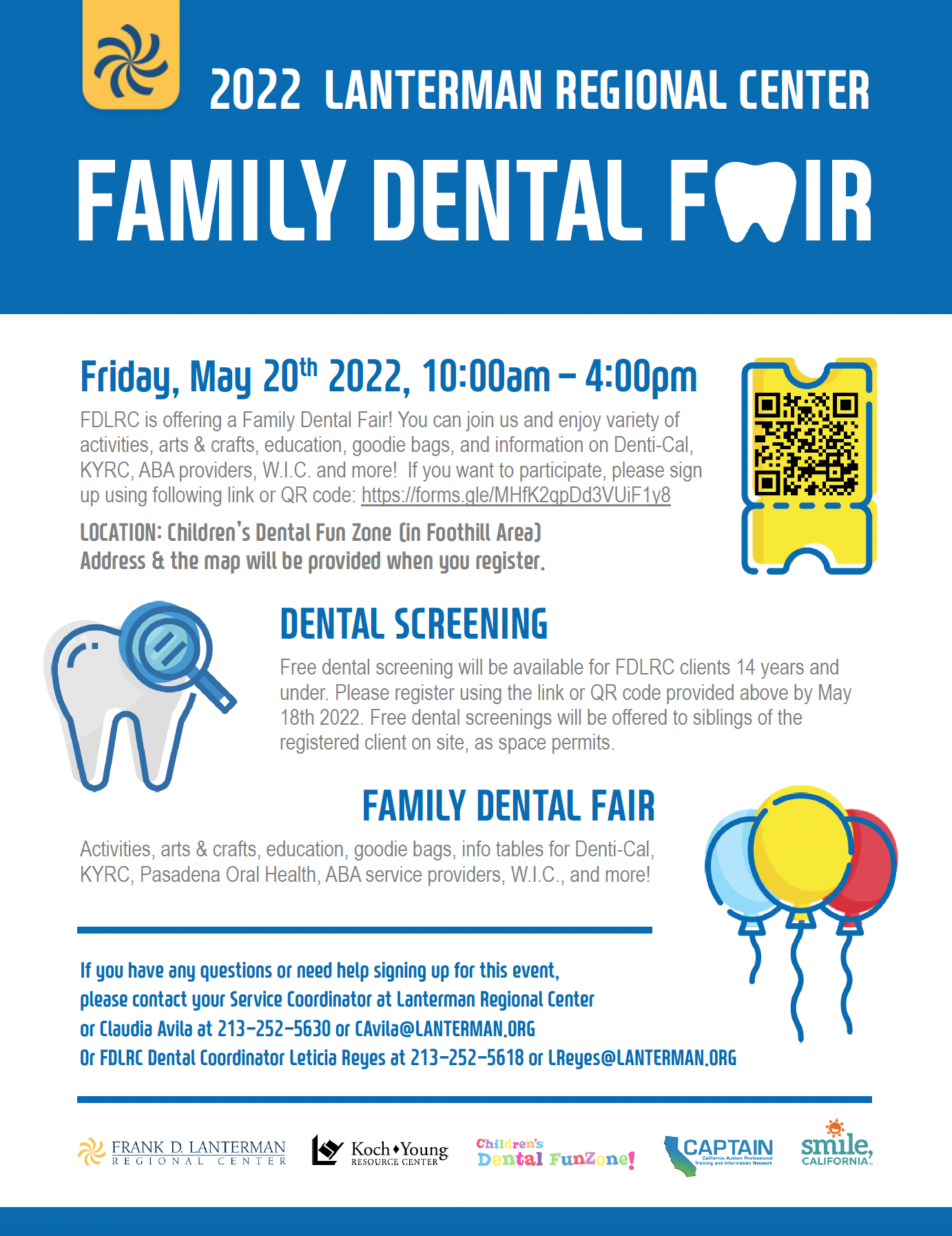
Lanterman, in collaboration with the Children’s Dental Fun Zone in Eagle Rock, invites Lanterman families to our community dental health fair to be held on Friday, May 20, 2022 from 10 a.m. to 4 p.m.
Learn about the Children’s Dental Fun Zone providing special needs dental care in the Eagle Rock area. Please pre-register for the fair using the QR code on the flyer at the margin, by aiming your phone’s camera at the code and connect directly to the registration form for your family. Use this registration form also to pre-register your child for a free dental education and oral health screening at the fair.
- Learn about the importance of early dental screenings and early dental care in supporting speech, socialization, and overall health in your child.
- Review simple evidence-based strategies to support the development of consistent dental health habits like brushing twice per day and visiting the dentist regularly.
- Connect with supportive resources including Denti-Cal, Pasadena Oral Health Foundation WIC and CAPTAIN.
- Learn about the Lanterman Koch-Young Resource Center which offers an extended lending library of resources, family support programs, and family support groups to help families connect with others in the Lanterman community.
- And meet and greet service providers who can provide parent training and education in supporting important adaptive skills developments, including good oral health and habits in children from infancy through adulthood.
Fun activities for children will include arts and crafts, games and educational activities. Families can learn about simple evidence based practices that can be used at home every day to support the development of good daily oral health habits. Goodie bags will be provided for all children participating in the event.
We hope to see you there!!
Files
Preparing for Adulthood
Posted on: Mar 15, 2022

As adolescents transition to adulthood, plans should already begin about where and with whom the individual will live, how they will support themselves and navigate their community, how they will obtain medical and dental care, and how they will sustain a rewarding circle of social involvements and activities. Have you considered transportation, or driving? Communication and advocacy? Voting? Sexual relationships and safety? Working or going to college? How can you support the young adult in your life to optimize their independence and personal satisfaction?
The Center on Secondary Education for Students with Autism Spectrum Disorder provides resources based in research to guide individuals and families through many of these considerations. The Center’s resources include helpful background information as well as steps to developing independence over time through responsibilities and activites of daily living (getting a driver’s license, money management, daily living skills, self-determination). Their “Peer to Peer resources” provide a unique perspective for adolescents with ASD on topics including Healthy Dating Relationships, Planning for Life After High School, and Finding and Applying for Jobs, among others. Resources are linked to evidence-based practices useful in addressing specific goals as well as training modules in implementing the evidence based practices, through AFIRM, as well as other evidence-based resources. See the CAPTAIN website for additional current information on the role of evidence-based practices in supporting lifelong outcomes for individuals with Autism and Developmental Disabilities.
Preparing for life after high school takes some time and foresight. The best time to plan is before your family member leaves the structured and supportive environment of the high school setting and is left without supports to navigate these new responsibilities. Lanterman Regional Center is here to support you and your family members with resources to help. Education and training resources on a variety of important topics are available on the Lanterman.org website and through our ARCA Learn platform. Information and services to support self-determination, employment and day services, diverse living options, and self-advocacy, including purchase of services standards can be reviewed to help link your family to the supports Lanterman offers. The Koch-Young Resource Center coordinates parent and client support groups for additional discussion and collaboration with others in your community that are confronting similar questions and concerns.
Discuss your family member’s needs for support in the area of independence, health, vocational training, and socialization tailored to their individual strenghts and desires with your Regional Center service coordinator, your child’s school, and/or your behavior health treatment provider. Preparation and practice during adolescence will improve outcomes and support a fuller level of participation in family and community activities into adulthood.
File
Tools Towards Independence
Posted on: Dec 08, 2021

Adolescence is a time to work on important skills that will prepare learners for a future full of possibilities. That might include higher education, learning job or career skills, coping with stress, anxiety, fear and depression, and living as independently as possible based on a person’s own desires and strengths. A number of proven strategies that can teach skills and promote independence are identified in the new 2020 publication “Evidence-Based Practices for Children, Youth, and Young Adults with Autism1”, which summarizes intervention research in autism published between 1990 and 2017. The report is available for download from the National Clearinghouse of Autism Education and Practice.
The report identifies evidence based approaches to help autistic youth realize outcomes that support success as adults. Recent years have produced an increasing number of interventions that successfully improved academic, vocational and mental health outcomes, as well as a newer area of outcomes related to self-determination. These strategies are effective in developing skills for living, working, and engaging in social and leisure activities with increased independence as youth transition into adulthood.
Putting knowledge of evidence-based approaches into actual practice is made easier through step-by-step learning modules that provide the background and procedures for using the practice within the natural contexts of an individual’s identified life goals. Using AFIRM (Autism Focused Interventions Resources and Modules), caregivers can learn evidence based methods including Antecedent Interventions, Cognitive Behavioral/Instructional Strategies, Self-Management, Technology Aided Instruction, Video Modeling, and Visual Supports, and others. These strategies are identified to support individuals with skills that help manage emotions, feelings and anxieties, learn vocational tasks, organize their daily activities, advocate for themselves, and take increasing responsibility for progress towards their individual goals. Caregivers can obtain coaching in the use of evidence based interventions listed above through behavior health services provided through the health insurance provider, Department of Mental Health, or through ABA services as offerred through the Regional Center.
ABA is not just for kids!! Discuss your family member’s needs for support in the area of independence, mental health, and vocational training tailored to their individual strengths and desires with your Regional Center SC and/or your behavior health treatment provider. Preparation and practice during adolescence will improve outcomes and support a fuller level of participation in family and community activities into adulthood.
Back to School – Preparing Your Family to Transition Back to In-Person Schooling
Posted on: Apr 05, 2021
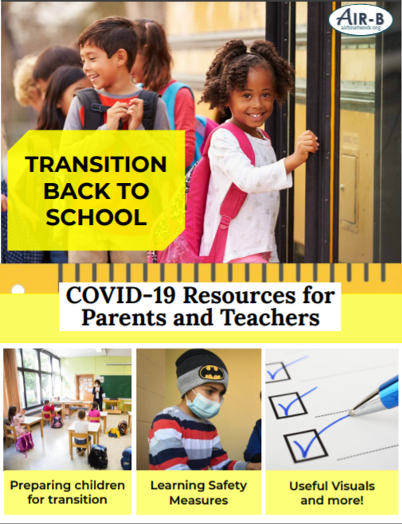
Finally, what we have all been waiting for will soon be here. For many, our year of distance learning, while necessary, is happily coming to an end. How do parents prepare for our transition back to what was normal before, but different now? Many parents are seeking additional information regarding methods they can use at home to support their family member’s transition back into in-person educational programming services. To that end, the Autism Team at Lanterman wants to share resources important for parents as we transition back to in-person educational services, along with evidence based practices recommended to support clients and families proactively to promote the smoothest possible transition.
Available for download through CAPTAIN, in English, Spanish and Korean, is a lovely booklet for parents providing social narratives, advice regarding IEP services, connecting with your child’s educational support team, and addressing lost time that may have been experienced during distance learning conditions. To prepare for a return to in-person learning, our family members will need to learn to wear facial coverings while at school, understand rules of social distancing, familiarize themselves with newly designed classroom arrangements with greater distance and perhaps plexi-glass barriers, and hand hygiene requirements. Be prepared and help your learner to transition back to school with less fear and anxiety and a sense of comfort, safety, and excitement to see their teachers and friends.
Our New Frontier
Posted on: Jan 21, 2021

Supporting Distanced Learning and Wearing Face Coverings Using Evidence-Based Strategies
Our new year brings continued challenges for supporting family members through the COVID 19 crisis. Many parents are seeking additional information regarding methods they can use at home to support their family member’s distance learning as well as approaches they can use to teach and promote the wearing of facial coverings for individuals challenged by intellectual, sensory and other developmental differences. To that end, Lanterman's Koch-Young Resource Center will be featuring trainings and discussions in coming months explaining how parents can work with teachers and behavior support instructors to implement evidence-based strategies to simplify IEP goals, enhance motivation, make learning more relevant, and support social connections through technology. To prepare for a return to in-person learning, our family members will need to learn to wear facial coverings while outside the home. Please connect with the Koch-Young Resource Center family support group coordinators Evie Jung (ejung@lanterman.org) or Joe Perales (jperales@lanterman.org) to learn about upcoming KYRC presentations to help support distance learning and wearing facial coverings using strategies grounded in evidence-based practice.
Coming in February, Lanterman's Clinical Services team will begin a series of monthly trainings on topics of interest to our community. Family members, service providers, service coordination staff, and the community at large are invited to hear one-hour presentations followed by audience Q & A live over Zoom, and recorded for later viewing. Topics including diagnostic considerations in eligibility, characteristics of developmental disabilities, medical considerations, psychiatric and mental health needs and interventions, behavior management, supporting dental health, and specialized programs to expand eligibility for government support will be covered. Translation services will be made available given prior request. Register for upcoming presentations here.
File
Helping Others Through COVID-19: Strategies to Use at Home
Posted on: Sep 25, 2020
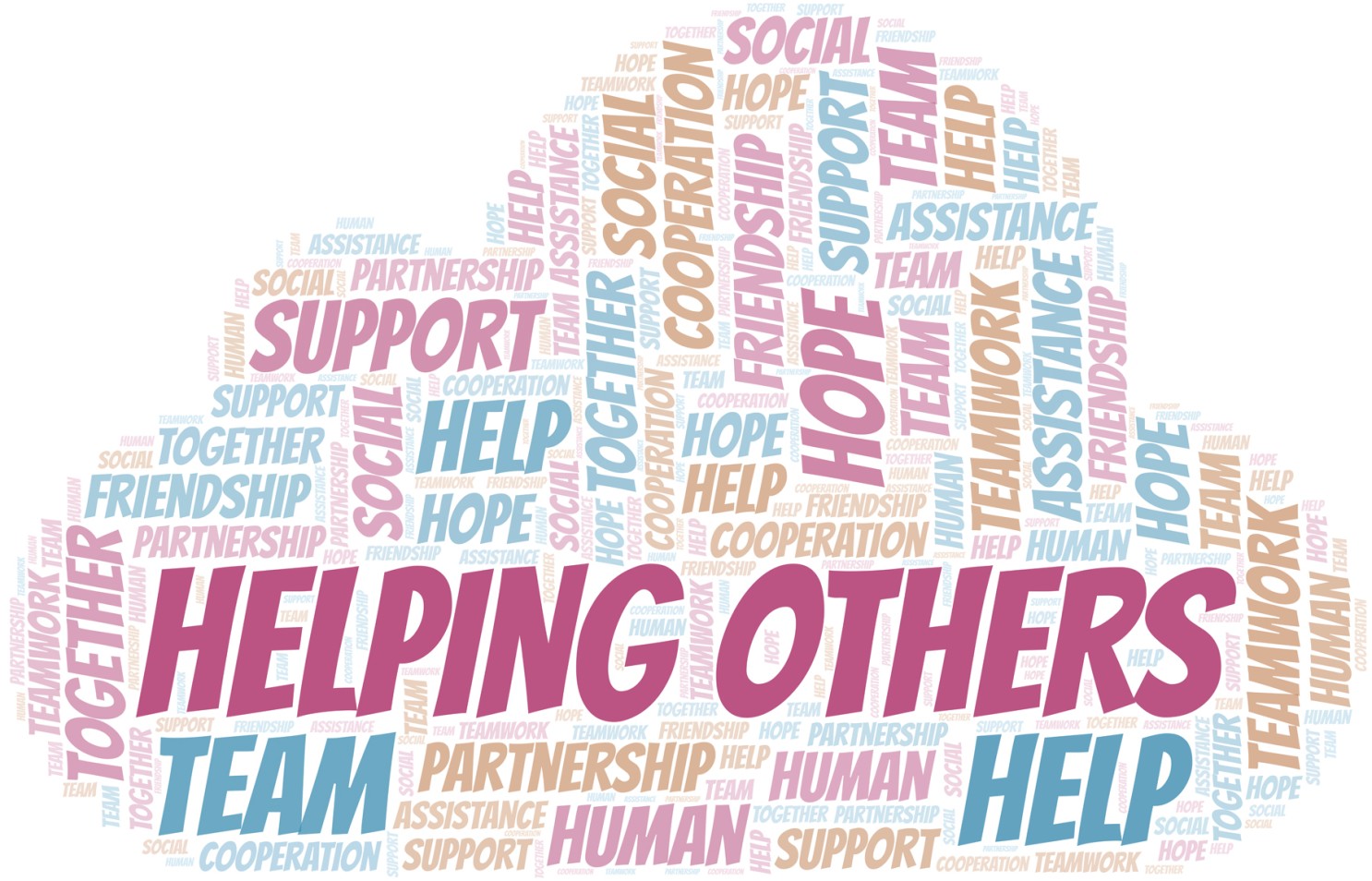
Coming to a Lanterman Support Group Near You
Everything has changed so suddenly. For persons with developmental disabilities, sudden, unexpected changes can create added hurdles that may be more difficult to overcome. As you provide support to someone in your family in coping with COVID-19, there are simple but effective strategies to help you and your family member adjust to the changes together, until such time as our communities are safer again.
Simple evidence-based strategies such as visual supports, picture scheduling, prompting and reinforcement, task analyses, shaping and chaining, and self-management are key tools for supporting someone with a disability to learn new routines and “rules of the road”. Teaching strategies to support understanding of the pandemic, promote expression, develop coping mechanisms, and maintain social interaction are discussed as important supports for someone with a disability.
As schools and day programs reopen in new and different formats, the importance of hand hygiene, wearing masks and maintaining social distancing become key. Choosing the safest way to travel or to shop for groceries requires forethought, preparation and practice.
A simple overview training of helpful techniques is coming to a Lanterman support group near you. Please connect with the Koch-Young Resource Center family support group coordinators Evie Jung (ejung@lanterman.org) or Joe Perales (jperales@lanterman.org) to learn more.
Available for download:
Supporting Individuals with Autism through Uncertain Times.1 Resources for supporting individuals with autism during COVID-19 “Stay Home-Stay Safe” Guidance - The seven support strategies in this booklet are designed to meet the unique needs of children and young adults with autism during this period of uncertainty, including examples and ready-made resources to promote understanding of the virus, learn strategies to develop and maintain structured routines, practice coping skills, and self-manage personal care activities, exercise routines, and school connections while engaging in social distancing. (Available also in Arabic, Chinese, Italian, Japanese, Mandarin and Spanish)
1. Hume, K., Waters, V., Sam, A., Steinbrenner, J., Perkins, Y., Dees, B., Tomaszewski, B., Rentschler, L., Szendrey, S., McIntyre, N., White, M., Nowell, S., & Odom, S. (2020). Supporting individuals with autism through uncertain times. Chapel Hill, NC: School of Education and Frank Porter Graham Child Development Institute, University of North Carolina at Chapel Hill.
Retrieved from: https://afirm.fpg.unc.edu/supporting-individuals-autism-through-uncertain-times
Supporting Adults with Autism through Uncertain Times: Companion Guide.2 This guide was developed as a response to self-advocates and family members seeking resources for adults. It is intended to centralize many different adult-specific resources and can serve as a supplement or companion guide to the Supporting Individuals with Autism through Uncertain Times toolkit, which was developed for families of children and youth with autism. This is an excellent resource ARFs, ILS/SLS, day programs, and any other agencies providing adult services to individuals with ASD.
The materials are divided into four topic areas: COVID-19 Resources, Daily Living Resources, Social Connectedness Resources, and Mental Health Resources. Each section contains developed materials and links to websites for other materials that may be useful.
2. Sam, A., Dees, B., Waters, V., Hume, K., Steinbrenner, J., Tomaszewski, B., Perkins, Y., White, M., Rentschler, L., McIntyre, N., Szendrey, S., Nowell, S., & Odom, S. (2020). Supporting adults with autism through uncertain times: Companion guide. Chapel Hill, NC: School of Education and Frank Porter Graham Child Development Institute, University of North Carolina at Chapel Hill.
Retrieved from: https://afirm.fpg.unc.edu/supporting-individuals-autism-through-uncertain-times
What is meant by Evidence Based Practice in Autism?
Posted on: Jul 01, 2020
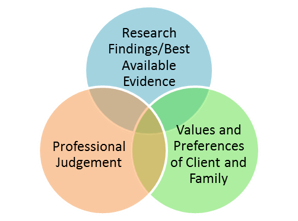
Effective intervention in autism is based in understanding the importance of Evidence Based Practices. Evidence-Based Practice (EBP) is an approach to treatment across many professional disciplines that seeks to blend together research findings and best available evidence with professional judgement in support of the values and preferences of client and families. In autism, time is precious, and parents need to know which approaches hold most promise for their circumstances.
Evidence based practices rely on interventions, services, or other practices for which there is scientifically-based research that demonstrates its effectiveness. Systematic, objective procedures are used to provide reliable interventions and learning activities that are proven effective to address specific goals in everyday situations. Strategies to address communication, self-care skills, play skills, cognitive development, motor skills, and a variety of other developmental goals are available for use by parents and service providers to address significant needs of people with autism and other developmental disabilities through a variety of resources.
Information regarding evidence based treatments that have been demonstrated effective for persons with autism and related disorders has been extensively reviewed and categorized in terms of the strength of the science supporting particular approaches (NCAEP, 20201; National Standards Project, 20152; NSPD, 20143). Step-by-step training in specific evidence based practices has been developed through the National Professional Development Center on Autism Spectrum Disorders and is available online at project AFIRM (Autism Focused Intervention Resources & Modules).
- 1. National Clearinghouse on Autism Evidence and Practice (2020). Evidence-based practices for children, youth, and young adults with Autism. The University of North Carolina at Chapel Hill, Frank Porter Graham Child Development Institute.
- 2. National Autism Center. (2015). Findings and conclusions: National standards project, phase 2. Randolph, MA: Author
- 3. Wong, C., Odom, S. L., Hume, K. A., Cox, C. W., Fettig, A., Kurcharczyk, S., et al. (2014). Evidence-based practices for children, youth, and young adults with autism spectrum disorder: A comprehensive review. Journal of Autism and Developmental Disorders.
Supporting Adults with Autism through Uncertain Times: Companion Guide
Posted on: Apr 28, 2020
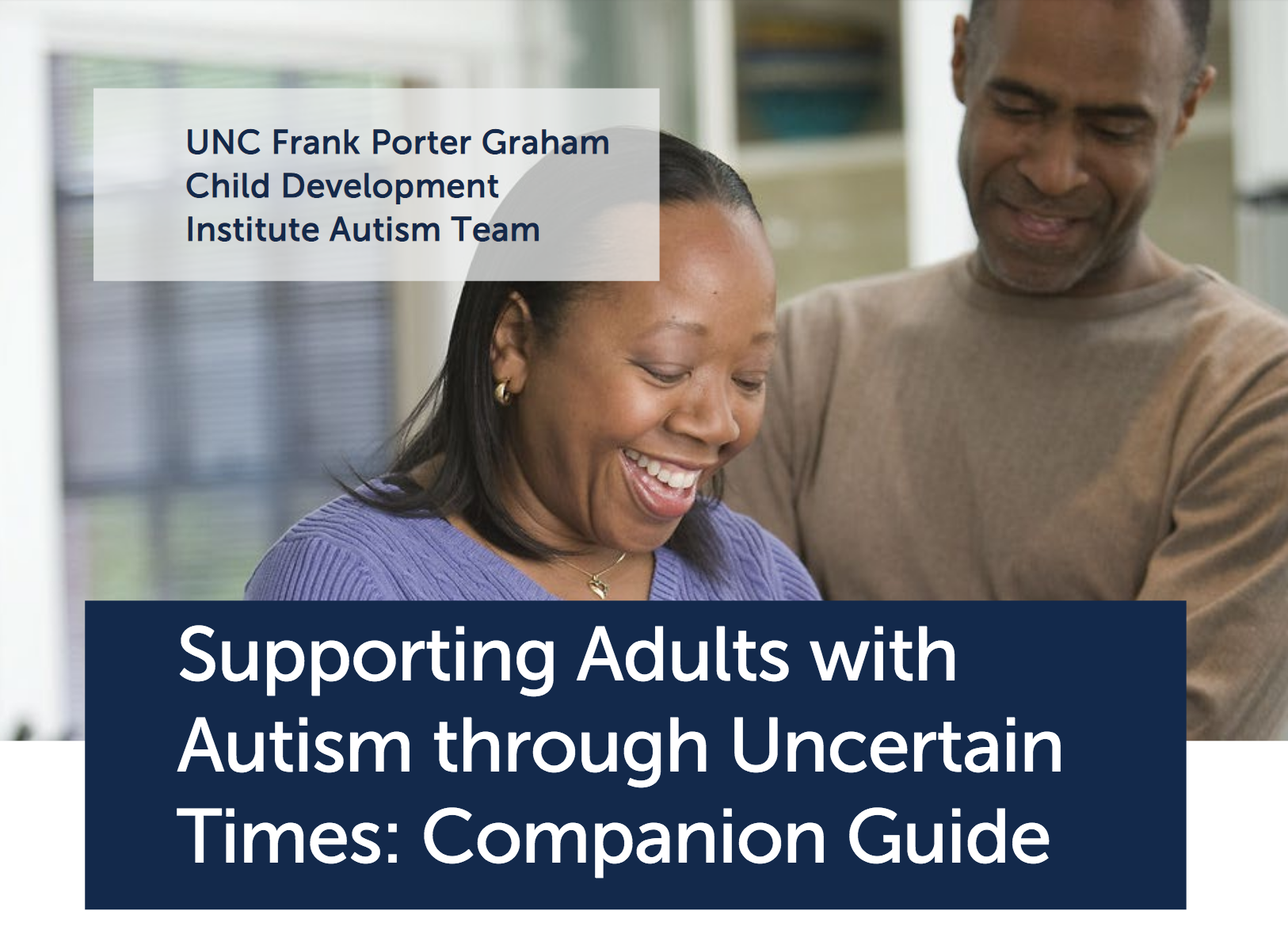
This guide was developed as a response to many self-advocates and family members who reached out to our team to develop resources for adults. It is intended to centralize many different adult-specific resources and can serve as a supplement or companion guide to the Supporting Individuals with Autism through Uncertain Times toolkit, which was developed for families of children and youth with autism. This is an excellent resource ARFs, ILS/SLS, day programs, and any other agencies providing adult services to individuals with ASD.
The materials are divided into four topic areas: COVID-19 Resources, Daily Living Resources, Social Connectedness Resources, and Mental Health Resources. Each section contains developed materials and links to Web site for other materials that may be useful.
Sam, A., Dees, B., Waters, V., Hume, K., Steinbrenner, J., Tomaszewski, B., Perkins, Y., White, M., Rentschler, L., McIntyre, N., Szendrey, S., Nowell, S., & Odom, S. (2020). Supporting adults with autism through uncertain times: Companion guide. Chapel Hill, NC: School of Education and Frank Porter Graham Child Development Institute, University of North Carolina at Chapel Hill.
Retrieved from: https://afirm.fpg.unc.edu/supporting-individuals-autism-through-uncertain-times
File
Supporting Individuals with Autism through Uncertain Times
Posted on: Apr 28, 2020
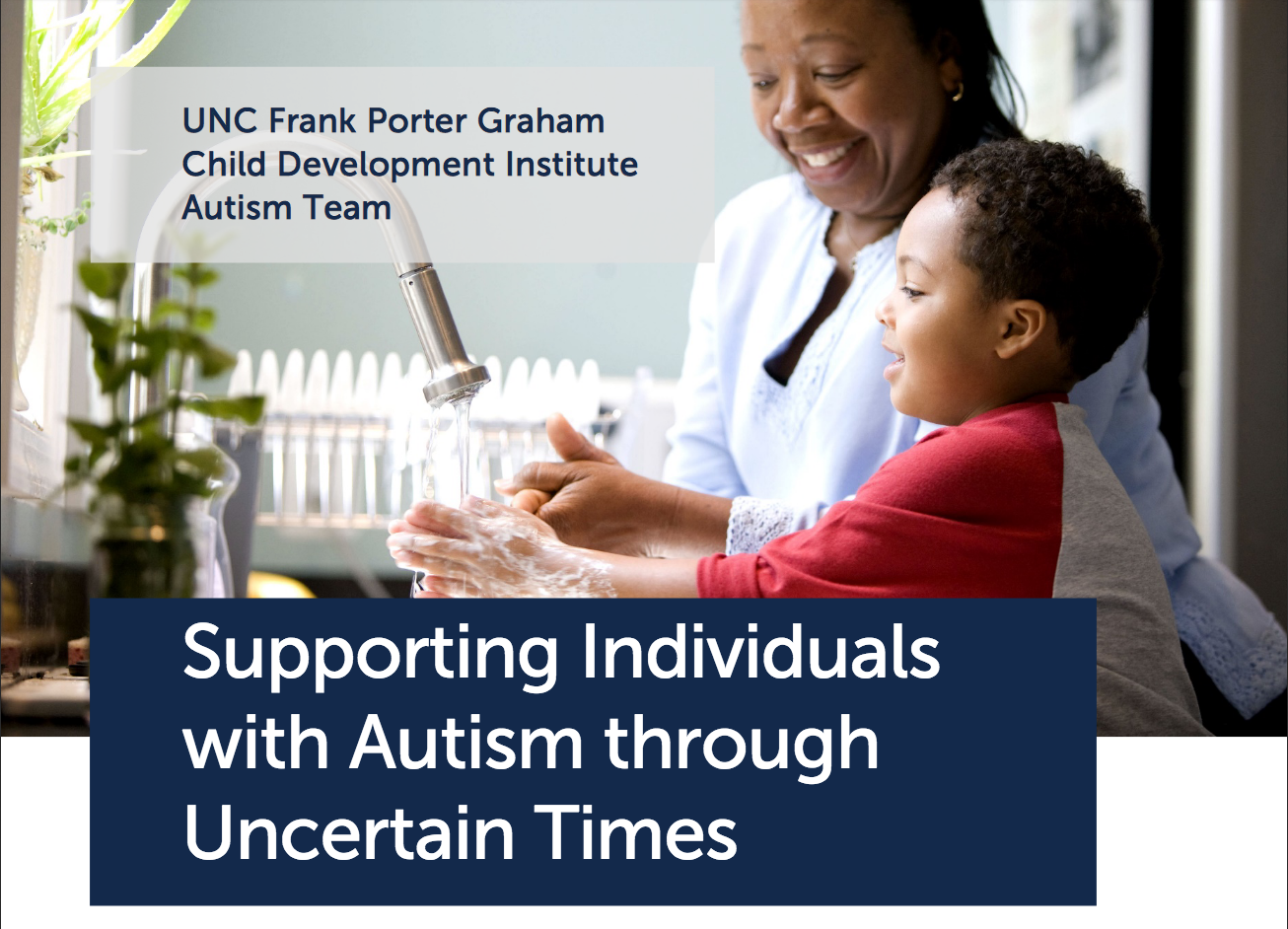
Resources for supporting individuals with autism during COVID-19 “Stay Home-Stay Safe” Guidance
All children and young adults require support from caregivers during times of stress and uncertainty, such as those we are facing now with the spread of the coronavirus (COVID-19). The seven support strategies in this booklet are designed to meet the unique needs of children and young adults with autism during this period of uncertainty, including examples and ready-made resources to promote understanding of the virus, learn strategies to develop and maintain structured routines, practice coping skills, and self-manage personal care activities, exercise routines, and school connections while engaging in social distancing. (Also available in Arabic, Chinese, Italian, Japanese, Mandarin and Spanish)
Hume, K., Waters, V., Sam, A., Steinbrenner, J., Perkins, Y., Dees, B., Tomaszewski, B., Rentschler, L., Szendrey, S., McIntyre, N., White, M., Nowell, S., & Odom, S. (2020). Supporting individuals with autism through uncertain times. Chapel Hill, NC: School of Education and Frank Porter Graham Child Development Institute, University of North Carolina at Chapel Hill.
Retrieved from: https://afirm.fpg.unc.edu/supporting-individuals-autism-through-uncertain-times
File
Importance of Early Identification and Intervention
Posted on: Apr 28, 2020
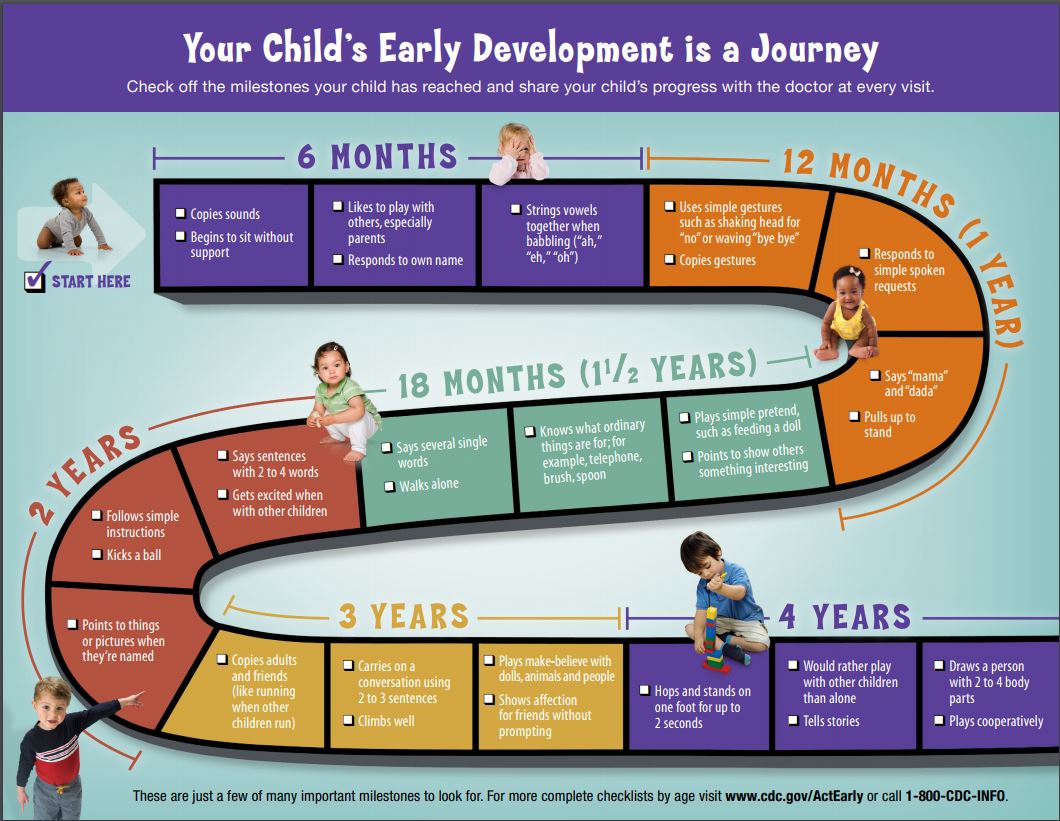
April is National Autism Awareness Month
Early identification and intervention is a key to improving outcomes for people with ASD for a number of reasons. Early intervention is important because intervention is likely to be more effective when it is provided earlier rather than later in life. A child’s ability to learn is greatest during their first three years of life. Over time, it becomes harder to learn and make change. High quality early intervention can change a child’s developmental path and improve outcomes for both the child and their family.1
The Center for Disease Control’s Learn the Signs - Act Early (also in Spanish) campaign aims to improve early identification of children with autism and other developmental disabilities so children and families can get the services and support they need. Parents can follow their child’s development using developmental tracking tools (available in English, Spanish, Korean, and Chinese) through the Learn the Signs Act Early program and obtain early guidance for information, intervention and support should concerns arise.
At Lanterman Regional Center, the Early Start (also in Spanish) program serves children from birth to 3 who are born with, or at risk for, developmental delay or disability. We know that the earlier an infant or toddler with special needs receives appropriate services, the more successful we can be in minimizing or preventing future disabilities. For this reason, our Early Intervention unit works with families to access services and supports that help identify and treat developmental concerns including signs of autism as early as possible in the life of the child.
1. The Importance of Early Intervention for Infants and Toddler with Disabilities and their Families. National Early Childhood Technical Assistance Center, July 2011.
February is Children’s Dental Health Month
Posted on: Feb 13, 2020
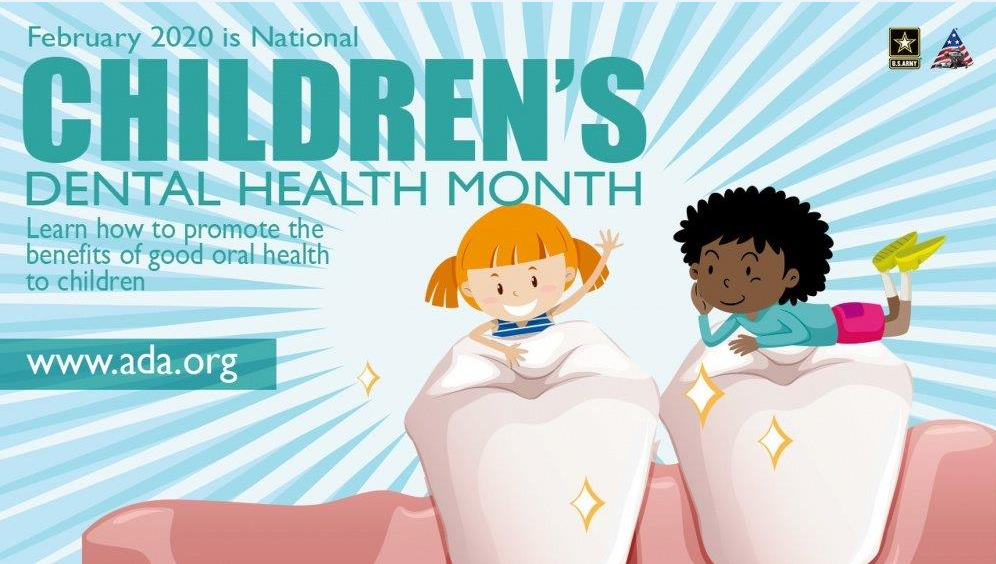
National Children's Dental Health Month is brought to you by the ADA. This month-long national health observance brings together thousands of dedicated professionals, healthcare providers, and educators to promote the benefits of good oral health to children, their caregivers, teachers and many others.
Files
What is Autism?
Posted on: Feb 13, 2020
Autism spectrum disorder (ASD) is a developmental disability that can cause significant social, communication and behavioral challenges. There is often nothing about how people with ASD look that sets them apart from other people, but people with ASD may communicate, interact, behave and learn in ways that are different from most other people. The learning, thinking and problem-solving abilities of people with ASD can range from gifted to severely challenged. Some people with ASD need a lot of help in their daily lives; others need less.
A diagnosis of ASD now includes several conditions that used to be diagnosed separately: autistic disorder, pervasive developmental disorder not otherwise specified (PDD-NOS), and Asperger syndrome. These conditions are considered to represent a spectrum of symptomology and severity that together are now called autism spectrum disorder.1 Diagnostic information on ASD is also available in Spanish.
Autism Fact Sheets: Features of autism can sometimes be observed in children even younger than 18 months of age. First signs may appear as differences in the social, emotional or communication development of their child. When these concerns occur along with frequent repetitive behaviors or difficulties in adjusting to environmental changes, it may be wise to consult further with a pediatrician, neurologist or psychologist. Autism fact sheets summarizing early signs are available in English and thirteen other languages including Arabic, Armenian, Chinese, Farsi, French, German, Italian, Japanese, Korean, Spanish, Tagalog, Thai, and Vietnamese.2
1. National Center on Birth Defects and Developmental Disabilities, Centers for Disease Control and Prevention, 8/27/2019
2. Adapted from CDC by the University of Southern California University Center for Excellence in Developmental Disabilities, Children’s Hospital Los Angeles, May 2011.
















